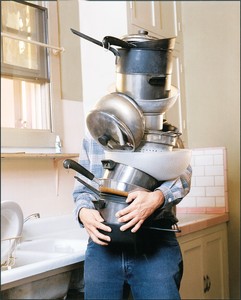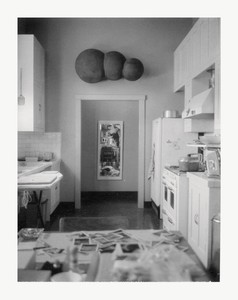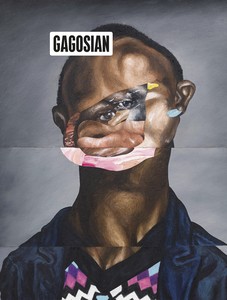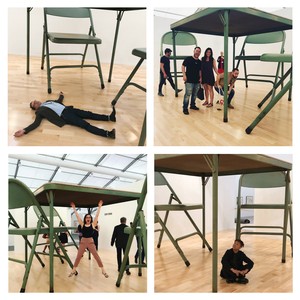
Bob’s World
Alexander Wolf discusses the recurring themes and symbols that have emerged throughout Robert Therrien’s artistic career.
Gagosian is pleased to present new sculptures and selected works on paper by Robert Therrien. In this exhibition—Therrien’s first in New York in ten years—are three free-standing rooms.
In his investigations of form, perception, and subjectivity, Therrien isolates elements and objects from domestic or daily life, detaching them from their known functions. Time and again, his work—which includes towering stacks of plates and massive tables and chairs—demonstrates the transformative power of scale and viewpoint. Sculptures in the current exhibition include highly polished, oversize drops, a large tied bow, and a flagpole, which, although recognizable, is constructed illusionistically according to aerial perspective.
Through shifts in perspective and scale, Therrien renders ordinary experience uncanny. This effect is demonstrated in his constructions of interior spaces, such as Red Room (2000–07), which holds some nine hundred red objects in a closet-sized space (now in the Tate Collection, London). Transparent Room (2010) contains a bed, clothing, a mirror, parts of a chandelier, packing materials, and more—the greenhouse-like structure and its contents all rendered totally transparent in glass and plastic. In the manner of set design, some of the contained objects are found, others made. The frosted nineteenth-century factory windows create the potential for apparitions; ordinary objects thus coalesce into a fragile, ghostly environment that is also a sculptural portrait.
Despite their verisimilitude, Therrien’s rooms impede the viewer’s ability to engage with space in any comfortable way. Meticulously assembled features of common industrial design allow one to stand in front of architectural vistas. Elevated above ground level and cut away to show interiors that, like dioramas, become impenetrable replicas of reality, each is like a mise-en-scène or readymade. No title (room, panic doors) (2013–14) presents a set of doors in a room filled with fluorescent light. In No title (paneled room) (2017), tambourines rest silently on the floor of a room luxuriously paneled in hardwood, and a ladder leads to a trapdoor in the ceiling. Each room transports the viewer out of the gallery and into a new narrative situation, prompting connections between material details and their subconscious associations. By making use of everyday things that are often overlooked, Therrien situates the viewer in familiar territory, then allows the objects to demand reassessment as instruments of subjectivity and of consciousness itself.

Alexander Wolf discusses the recurring themes and symbols that have emerged throughout Robert Therrien’s artistic career.

In honor of the extraordinary life of Robert Therrien (1947–2019), Aimee Gabbard writes about her time with the artist and explores his lifelong interest in photography.

The Fall 2019 issue of Gagosian Quarterly is now available, featuring a detail from Sinking (2019) by Nathaniel Mary Quinn on its cover.

Robert Therrien’s investigations of form, perception, and subjectivity often isolate recognizable elements and objects from everyday life. Blake Gopnik challenges the traditional readings of transformation and the purpose of scale in Therrien’s No title (folding table and chairs, green).